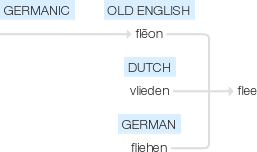Flee
Old English flēon, of Germanic origin; related to Dutch vlieden and German fliehen .
wiktionary
From Old English flēon, from Proto-Germanic *fleuhaną, from Proto-Indo-European *plewk-, *plew-(“to fly, flow, run”).
Cognate with Dutch vlieden, German fliehen, Icelandic flýja, Swedish fly, Gothic 𐌸𐌻𐌹𐌿𐌷𐌰𐌽( þliuhan). Within English, related to fly and more distantly to flow.
etymonline
flee (v.)
Old English fleon, flion "take flight, fly from, avoid, escape" (contracted class II strong verb; past tense fleah, past participle flogen), from Proto-Germanic *fleuhanan "to run away" (source also of Old High German fliohan, Old Norse flöja, Old Frisian flia, Dutch vlieden, German fliehen, Gothic þliuhan "to flee"), probably from PIE *pleuk-, extended form of root *pleu- "to flow," but Boutkan is not convinced. Also compare fly (v.2).
Weak past tense and past participle fled emerged in Middle English under influence of Scandinavian. Old English had a transitive form, geflieman "put to flight, banish, drive away," which came in handy in the Anglo-Saxon Chronicle. Related: fled; Fleeing.
